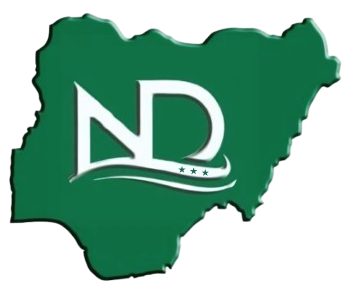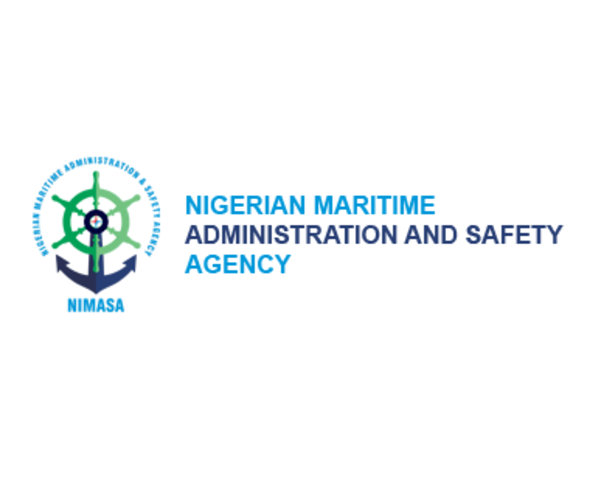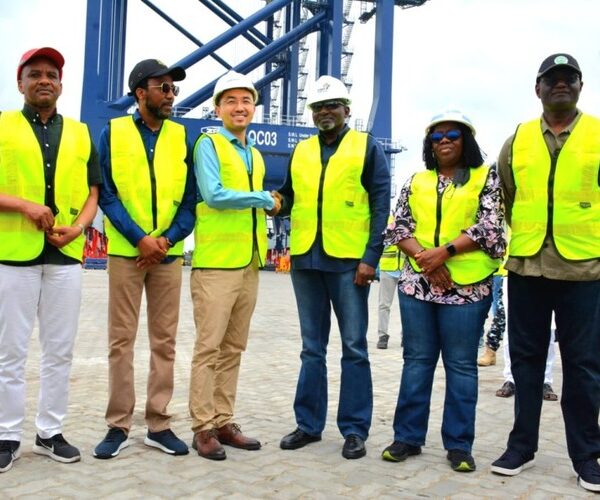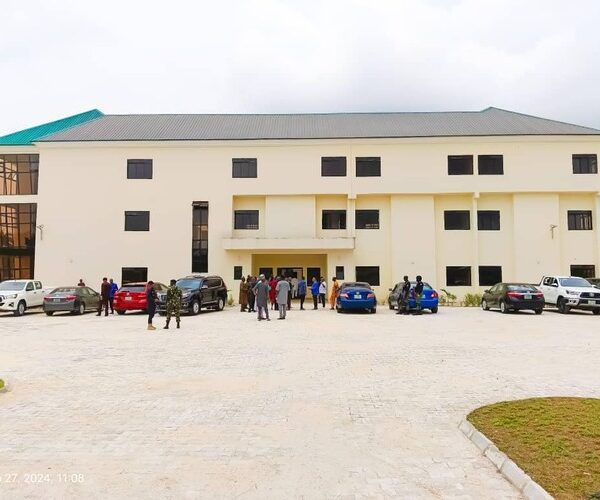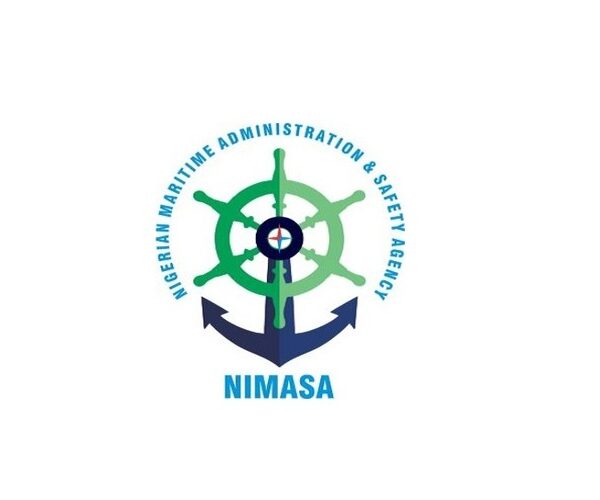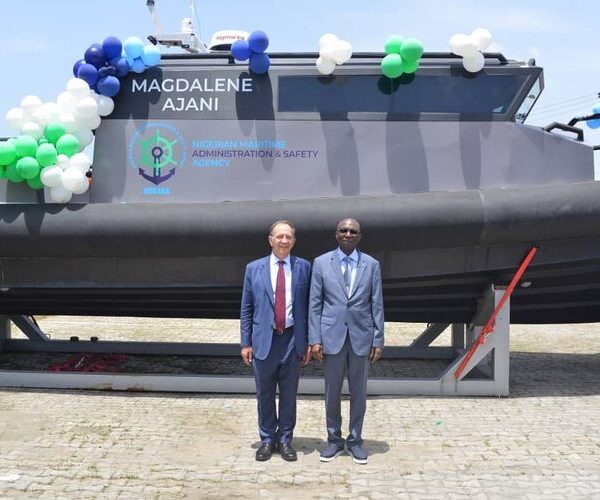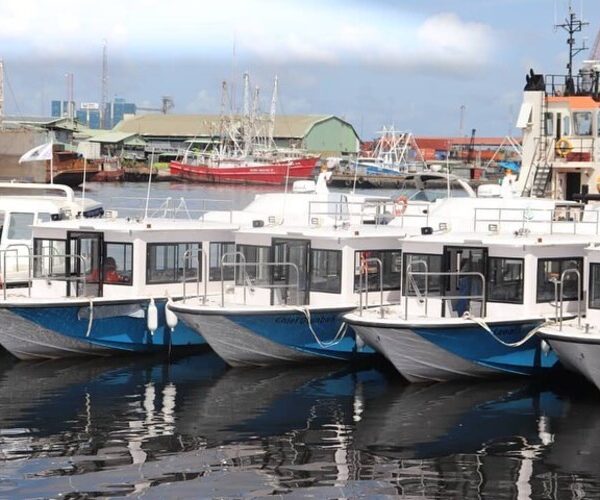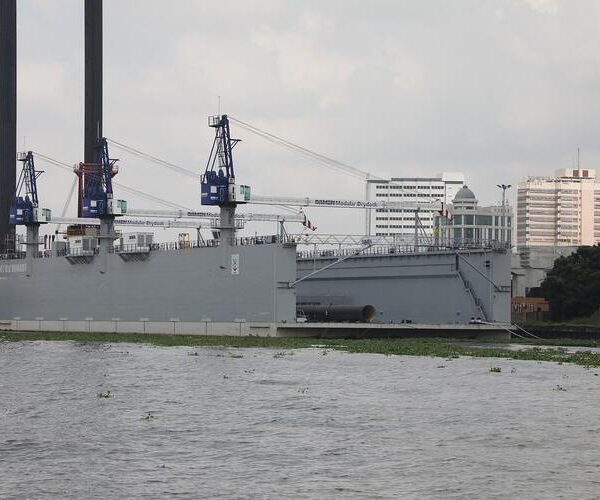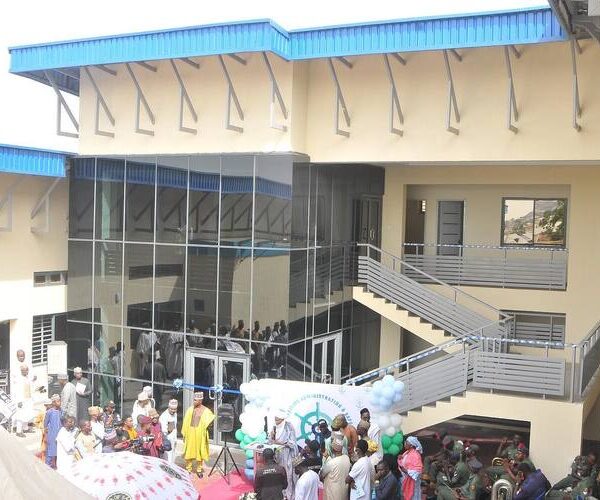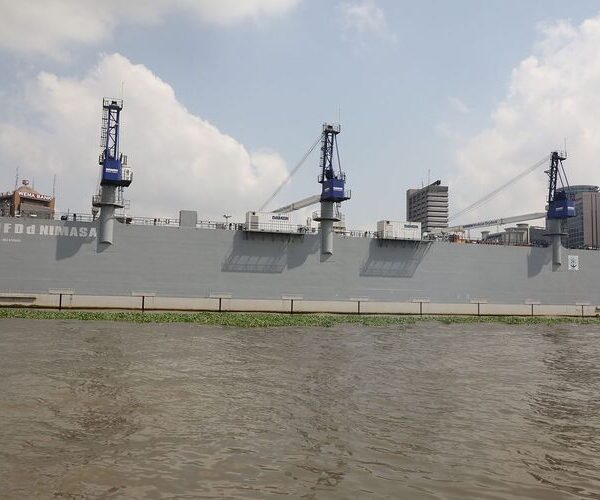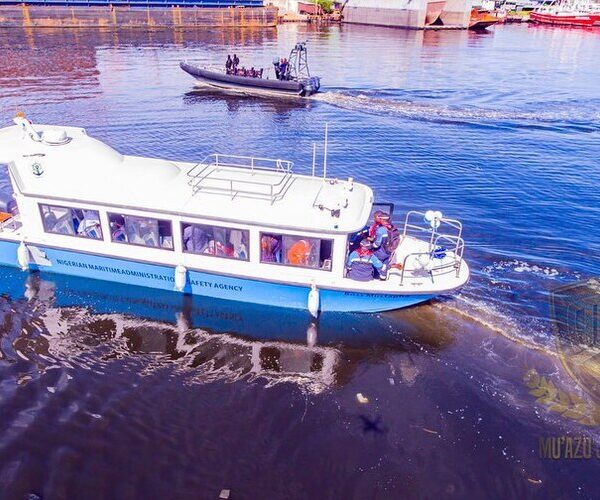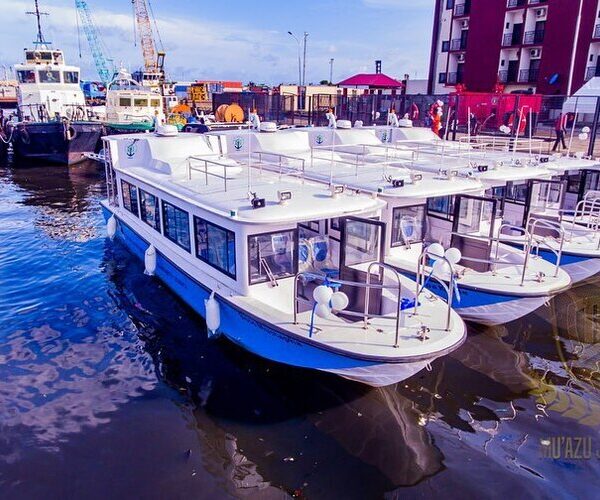- Government Organisation
- 35 Adetokunbo Ademola Street, Victoria Island, Lagos 106104, Lagos, Nigeria
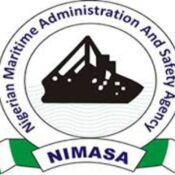
NIGERIAN MARITIME ADMINISTRATION AND SAFETY AGENCY (NIMASA)
Welcome to NIMASA
The Nigerian Maritime Administration and Safety Agency, NIMASA, is committed to the enthronement of global best practices in the provision of maritime services in Nigeria.
Our areas of focus include effective Maritime Safety Administration, Maritime Labor Regulation, Marine Pollution Prevention and Control, Search and Rescue, Cabotage enforcement, Shipping Development and Ship Registration, Training and Certification of Seafarers, and Maritime Capacity Development. Using modern tools that guarantee efficiency and effectiveness, we are determined to develop indigenous capacity and eliminate all hindrances.
About NIMASA
The Nigerian Maritime Administration and Safety Agency (NIMASA) is a governmental agency in Nigeria responsible for maritime regulation, safety, and security, as well as for the promotion of maritime activities in Nigeria.
Brief History
NIMASA was created on August 1, 2006, when the National Maritime Authority was merged with the Joint Maritime Labour Industrial Council. Both were formerly parastatals of the Federal Ministry of Transport.
The Nigerian Maritime Administration and Safety Agency (NIMASA) boasts a rich history deeply intertwined with Nigeria’s maritime evolution. NIMASA emerged as a pivotal entity, succeeding the National Maritime Authority (NMA) in overseeing the nation’s maritime affairs.
NIMASA’s inception marked a transformative phase in Nigeria’s maritime landscape. With a mandate encompassing regulation, safety, security, and promotion of maritime activities, the agency swiftly became a cornerstone of Nigeria’s maritime governance framework.
At its core, NIMASA is vested with multifaceted responsibilities. From regulating shipping activities and ensuring compliance with international maritime standards to fostering maritime safety, security, and pollution prevention, the agency operates as a stalwart guardian of Nigeria’s coastal waters and exclusive economic zone (EEZ).
Throughout its journey, NIMASA has been steadfast in its commitment to maritime safety and security. Collaborating with domestic and international stakeholders, the agency has pioneered initiatives to combat maritime crimes such as piracy and armed robbery, safeguarding Nigeria’s maritime domain and the lives of those who traverse its waters.
Yet, NIMASA’s impact extends beyond regulatory functions. The agency plays a pivotal role in promoting the growth and development of Nigeria’s maritime sector. Through strategic initiatives aimed at stimulating investment, enhancing infrastructure, and supporting indigenous shipping enterprises, NIMASA endeavors to propel Nigeria towards becoming a maritime powerhouse in the region.
Internationally, NIMASA serves as Nigeria’s emissary in global maritime forums, advocating for the nation’s interests and contributing to the shaping of international maritime policies and regulations.
In its relatively short existence, NIMASA has left an indelible mark on Nigeria’s maritime narrative. From its humble beginnings to its current stature as a beacon of maritime governance, the agency stands as a testament to Nigeria’s commitment to harnessing the vast potential of its maritime domain for the prosperity of its people and the advancement of its economy.
- Mandate: NIMASA’s primary mandate includes the regulation of shipping, maritime labor, and coastal waters in Nigeria. It also oversees maritime safety, security, and pollution prevention within Nigerian waters and the country’s exclusive economic zone (EEZ).
- Regulatory Functions: NIMASA regulates shipping activities, ensures compliance with international maritime conventions, implements maritime laws and regulations, issues certificates and licenses to vessels and seafarers, and conducts inspections and surveys of ships.
- Safety and Security: NIMASA is tasked with ensuring the safety and security of Nigerian waters against piracy, armed robbery, and other maritime crimes. It collaborates with other agencies and international organizations to enhance maritime security and combat illegal activities at sea.
- Promotion of Maritime Development: In addition to its regulatory functions, NIMASA plays a key role in promoting the development of Nigeria’s maritime sector. This includes initiatives to stimulate investment in maritime infrastructure, support maritime education and training, and facilitate the growth of indigenous shipping companies.
- International Engagement: NIMASA represents Nigeria in various international maritime forums and organizations, advocating for the country’s interests and participating in efforts to shape global maritime policies and regulations.
OUR VISION
To be the Leading Maritime Administration in Africa, advancing Nigeria’s Global Maritime goals
OUR MISSION
To achieve and sustain safe, secure shipping, cleaner oceans, and enhanced maritime capacity in line with the best global practices towards Nigeria’s economic development
CORE FUNCTIONS
- Pursue the development of shipping and regulatory matters relating to merchant shipping and seafarers.
- Administration and regulation of shipping licenses.
- Administration, Regulation, and Certification of Seafarers.
- Establishment of Maritime Training and Safety Standards
- Regulation of safety of shipping as regards the construction of ships and navigation.
- Provision of Maritime Search and Rescue Services
- Provide direction and ensure compliance with vessels security measures
- Carry out Air and Coastal Surveillance
- Control and prevent Maritime Pollution
- Develop and implement policies and programs, that will facilitate the growth of local capacity in the ownership, manning, and construction of ships and other maritime infrastructure.
- Enhance and administer the provision of the Cabotage Act. 2003
- Perform Port and Flag State duties.
- Provide Maritime Security.
Establish the procedure for the implementation of conventions of the International Maritime Organization (IMO) and the International Labour Organization (ILO), and other international conventions to which the Federal Republic of Nigeria is a party on Maritime Safety and Security, Maritime Labour, Commercial Shipping, and for the implementation of Codes, Resolutions and Circulars arising there.
OUR Core Values
- Commitment
- Accountability
- Professionalism
- Integrity
- Team Work
- Excellence
- Leadership
- Discipline
ORGANIZATIONAL STRUCTURE
The Triple “S” also known as the NIMASA Performance Tripod, is designed as the compass of the NIMASA’s executive management in charting the course of the Agency within the three cardinal concerns that truly reflect NIMASA’s composite of mandates as both the regulator and harnesser of Nigeria’s maritime domain.
It is a three-point strategic agenda of the critical elements of the NIMASA commission, drawn from the various legal and statutory instruments governing the agency’s existence and operations.
All of the various policy initiatives, interventions, plans, and partnerships of NIMASA are expected to be pursued on the platform of the tripod of Maritime Security as an Existential Priority, Maritime Safety as an Operational Necessity and Shipping Development with Economic Urgency.
Services
- Cabotage Services
- Ship Registration Services
- Legal Services
- Maritime Safety and Security
- Maritime Labor Employment
- Maritime Environment Management
- International Ship and Port Facility Security (ISPS)
- Servicom
Challenges
Despite its significant contributions to Nigeria’s maritime sector, the Nigerian Maritime Administration and Safety Agency (NIMASA) faces a multitude of challenges that impede its effectiveness and hinder the full realization of its mandate. These challenges include:
- Maritime Insecurity: One of the most pressing challenges confronting NIMASA is the issue of maritime insecurity, particularly piracy and armed robbery at sea. Despite efforts to combat these crimes, they continue to pose a significant threat to maritime safety and security, deterring investment and hindering the growth of Nigeria’s maritime industry.
- Regulatory Compliance: Ensuring regulatory compliance within Nigeria’s vast maritime domain is a formidable task for NIMASA. The agency struggles with enforcing maritime regulations, issuing licenses and certificates, and conducting inspections due to limited resources, inadequate infrastructure, and the vastness of Nigerian waters.
- Capacity Building: NIMASA faces challenges in human resource development and capacity building within the maritime sector. There is a shortage of skilled personnel, particularly in areas such as maritime law enforcement, maritime safety, and marine pollution response, which undermines the agency’s ability to effectively carry out its functions.
- Infrastructure Deficiency: The lack of adequate maritime infrastructure, including ports, navigational aids, and maritime communication systems, poses a significant challenge to NIMASA’s efforts to promote maritime safety and facilitate maritime commerce. Poor infrastructure hampers efficient port operations increases shipping costs, and undermines Nigeria’s competitiveness in the global maritime market.
- Corruption and Illicit Activities: Corruption and illicit activities within the maritime sector, including bribery, smuggling, and illegal bunkering, present significant challenges to NIMASA’s regulatory efforts. These activities undermine the rule of law, erode public trust, and hamper the agency’s ability to effectively regulate the maritime industry.
- Environmental Degradation: Environmental degradation, including oil spills, pollution, and illegal fishing, poses a threat to Nigeria’s marine ecosystem and maritime resources. NIMASA faces challenges in enforcing environmental regulations, conducting pollution response operations, and promoting sustainable maritime practices to mitigate the impact of environmental degradation.
Addressing these challenges requires concerted efforts from NIMASA, other government agencies, the private sector, and international partners. It necessitates investment in maritime infrastructure, capacity building, regulatory enforcement, and the adoption of innovative solutions to enhance maritime safety, security, and sustainability in Nigeria.
Summary
Overall, NIMASA serves as the focal point for maritime governance in Nigeria, working to ensure the safety, security, and sustainable development of the country’s maritime industry.
However, NIMASA grapples with several challenges, including maritime insecurity due to piracy and armed robbery, regulatory compliance issues stemming from resource constraints and the vastness of Nigeria’s maritime domain, capacity-building shortages, inadequate infrastructure, corruption, and illicit activities, and environmental degradation.
Addressing these challenges demands collaborative efforts from NIMASA, government agencies, the private sector, and international partners. It necessitates investments in maritime infrastructure, capacity-building initiatives, regulatory enforcement mechanisms, and the adoption of sustainable practices to enhance maritime safety, security, and sustainability in Nigeria.
Business Amenities
- Car Parking
- Funding: Federal
Contact Information
Opening Hours
Contact Business
Contact Business
Additional Information
Additional info


